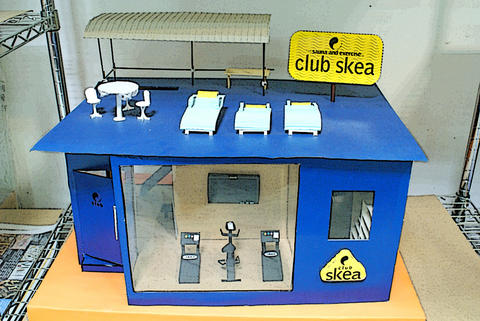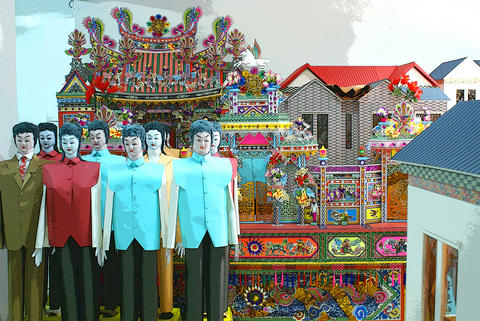Frank Hann (韓定) knew his wife's father was sick and that the time to buy him a house was quickly approaching. He spent some time looking at what the market had to offer, but didn't like the generic designs he saw. After failing to find the ideal home, he struck on an idea: he should build one himself.
Hann realized this was risky because he had no idea how to go about it and knew that he was breaking from Taiwanese tradition. To pull it off, he would have to involve the entire family, especially his mother-in-law.
With a relatively stable economy and changing consumer habits, Taiwanese like Hann are demanding greater variety in the paper houses traditionally burned at funerals. To his surprise, the whole family got involved, and they eventually decided to build a small structure that resembled a hot spring because Hann's father-in-law had always dreamed of visiting Japan's hot springs. Poverty when he was younger and frail health before he died, however, made visiting Japan impossible. Soon after its completion, the family burnt it, sending it to the spirit world.

"This assuaged our regret at not being able to send my father-in-law to Japan when he was alive," Hann said in an interview with the Taipei Times. In the afterworld, Hann added, his father-in-law will be able to bathe in the hot spring whenever he wants.
During the process of searching for and eventually building the hot springs, Hann discovered that others were dissatisfied with the available selection of paper houses. Further investigation revealed to the marketing professional that perhaps personalized paper models were a niche market that hadn't been tapped. After drawing up a business plan and interesting six other investors, Skea (台灣燒趣王, www.skea.com.tw) opened for business in August.
A centuries-old tradition

Burning paper models - from Mercedes-Benz cars to houses - is a common practice at funerals in Taiwan. As many Taiwanese people believe the world spirits go to in the afterlife is a mirror of the human world, they also believe that the departed require a place to live, food to eat and money. Burning an object at a funeral in the human world transports it to the spirit world, which keeps the ghost of the departed happy and brings luck to the living.
"The tradition can be traced back to the Tang dynasty," says Tseng Kuang-hsing (曾光興), owner of Jixing Paper Art Co (吉興紙藝有限公司). Tseng began building paper model houses 40 years ago when he was 16 - a time, he says, when the industry was dominated by Taoist monks and priests.
Tseng oversees a staff of six employees at two different workshops on a narrow street in eastern Taipei. In the older of the two workshops, three craftspeople build traditional paper houses using long strips of bamboo for the structure and large pieces of paper with different patterns that can be found at any temple in Taiwan.
Deities from the Chinese pantheon adorn the larger of the paper houses, which range in price from NT$3,000 to NT$30,000. "The older generation prefers this kind of style," Tseng said, adding that it typically takes two days to construct the larger models.
Across the street at Tseng's second workshop, younger staff assemble more refined houses. Considerably smaller than the traditional houses, there are two- and three-story mansions (NT$25,000 and NT$55,000, respectively) as well as a Japanese-style bungalow (NT$20,000). These houses take between seven and 10 days to complete. There are no bamboo frames supporting these houses. Instead, the interior of each resembles that of a suburban North American home. Each room is meticulously designed and crafted. Some, for example, have armoires in front of a fireplace, a canopy bed in the master bedroom or a kitchen complete with refrigerator and stove.
With modernization of the industry has come an explosion in the products on offer. Tseng's glossy catalogue shows items such as PC desktop computers (NT$3,000), notebook computers (NT$1,500), a mahjong set (NT$1,500), a scooter (NT$3,500) and an airplane (NT$3,000), all made of paper. For the crooner in life, there are karaoke machines (NT$1,500). If things in the spirit world heat up, air conditioners can be purchased for NT$2,500.
Increased specialization over the past decade, Tseng says, has earned the industry greater respect. "People like me working in the industry were often shunned by the community," he says, recalling his early days in the business. "They wouldn't invite us into their homes."
Today, however, owners and managers are educated and dress in suits when dealing with customers, he said. The industry has been given a boost by computer programs that assist designers when making the paper models.
Tseng says his clients are mainly funeral homes, although word-of-mouth ensures a steady supply of clients for his business - which, he says, continues to grow.
Hann, on the other hand, says he refuses to work with funeral homes. Instead, Skea relies on a slick Web site and a unique business strategy. "We have arrived at the modern period but all those products are old," he said referring to the one-size-fits-all, computer-generated products that dominate the paper-model market. Sensing that his comments may offend the industry, he quickly adds: "This isn't to say that those products are bad, it's just that they don't really suit our modern lifestyle."
Skea is providing more than just a tangible product. Hann believes his customers don't simply want an object to burn, but a whole service that demonstrates respect for the deceased. "It has little to do with the product and more to do with getting the correct information so that the deceased lives a comfortable life in the afterworld," he said.
Selling a service
Skea doesn't begin a project until staff have developed an intimate profile of the deceased. This process involves spending hours with relatives and friends, lessening the solemnity and sadness because clients remember the merits of the dead.
"Our customers - whether family or friends - remember clearly the things that the dead liked in life," he said. "For example, if they chewed betel nut, we can make them betel nut."
The added service translates into big bucks. Built from scratch, Skea's customized paper houses cost NT$30,000 or more. High prices, however, haven't led to a shortage of clients. One night a few weeks ago, Hann loaded seven washing-machine sized boxes into the back of a truck. He says they earned roughly NT$500,000 in the first month they were open for business and thereafter have grown, on average, by 30 percent every month.
Even pets have their place in the afterlife - and in Skea's range of services. For the person who wants their pet to be as comfortable in death as in life, model houses for beloved feline or canine friends can be purchased starting at NT$15,000. The designs Skea can create, Hann says, are limited only by the memories the living have of the deceased.
"We are proud to provide the deceased with the desires that they might not have had in life and provide compensation for those living family members with regrets," he said.

June 2 to June 8 Taiwan’s woodcutters believe that if they see even one speck of red in their cooked rice, no matter how small, an accident is going to happen. Peng Chin-tian (彭錦田) swears that this has proven to be true at every stop during his decades-long career in the logging industry. Along with mining, timber harvesting was once considered the most dangerous profession in Taiwan. Not only were mishaps common during all stages of processing, it was difficult to transport the injured to get medical treatment. Many died during the arduous journey. Peng recounts some of his accidents in

What does the Taiwan People’s Party (TPP) in the Huang Kuo-chang (黃國昌) era stand for? What sets it apart from their allies, the Chinese Nationalist Party (KMT)? With some shifts in tone and emphasis, the KMT’s stances have not changed significantly since the late 2000s and the era of former president Ma Ying-jeou (馬英九). The Democratic Progressive Party’s (DPP) current platform formed in the mid-2010s under the guidance of Tsai Ing-wen (蔡英文), and current President William Lai (賴清德) campaigned on continuity. Though their ideological stances may be a bit stale, they have the advantage of being broadly understood by the voters.

Artifacts found at archeological sites in France and Spain along the Bay of Biscay shoreline show that humans have been crafting tools from whale bones since more than 20,000 years ago, illustrating anew the resourcefulness of prehistoric people. The tools, primarily hunting implements such as projectile points, were fashioned from the bones of at least five species of large whales, the researchers said. Bones from sperm whales were the most abundant, followed by fin whales, gray whales, right or bowhead whales — two species indistinguishable with the analytical method used in the study — and blue whales. With seafaring capabilities by humans

In a high-rise office building in Taipei’s government district, the primary agency for maintaining links to Thailand’s 108 Yunnan villages — which are home to a population of around 200,000 descendants of the Chinese Nationalist Party (KMT) armies stranded in Thailand following the Chinese Civil War — is the Overseas Community Affairs Council (OCAC). Established in China in 1926, the OCAC was born of a mandate to support Chinese education, culture and economic development in far flung Chinese diaspora communities, which, especially in southeast Asia, had underwritten the military insurgencies against the Qing Dynasty that led to the founding of